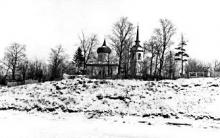Article menu:
The period of childhood and the events that happened to us during this period of development significantly influence the formation of a person’s personality. The life of literary characters, in particular, Ilya Ilyich Oblomov, is no exception.
Oblomov's native village
Ilya Ilyich Oblomov spent his entire childhood in his native village - Oblomovka. The beauty of this village was that it was located far from all populated areas, and, most importantly, very far from large cities. Such solitude contributed to the fact that all the residents of Oblomovka lived as if in conservation - they rarely went anywhere and almost no one ever came to them.
We invite you to read Ivan Goncharov’s novel “Oblomov”
In the old days, Oblomovka could well be called a promising village - canvases were made in Oblomovka, delicious beer was brewed. However, after Ilya Ilyich became the owner of everything, it all fell into disrepair, and over time, Oblomovka became a backward village, from which people periodically fled, since the living conditions there were terrible. The reason for this decline was the laziness of its owners and the reluctance to make even minimal changes in the life of the village: “Old Oblomov, as he accepted the estate from his father, passed it on to his son.”
However, in Oblomov’s memories, his native village remained a paradise on earth - after he left for the city, he never came to his native village again.
In Oblomov’s memoirs, the village remained as if frozen outside of time. “Silence and imperturbable calm reign in the morals of the people in that region. No robberies, no murders, no terrible accidents happened there; neither strong passions nor daring undertakings excited them.”
Oblomov's parents
The childhood memories of any person are inextricably linked with the images of parents or educators.
Ilya Ivanovich Oblomov was the father of the main character of the novel. He was a good person in himself - kind and sincere, but absolutely lazy and inactive. Ilya Ivanovich did not like to do anything - his whole life was actually devoted to contemplating reality.
They postponed all necessary matters until the very last moment, as a result, soon all the buildings on the estate began to collapse and looked more like ruins. The manor house, which was significantly distorted, did not escape the same fate, but no one was in a hurry to correct it. Ilya Ivanovich did not modernize his economy; he had no idea about factories and their devices. Ilya Ilyich’s father loved to sleep for a long time, and then look out the window for a long time, even if absolutely nothing happened outside the window.
Ilya Ivanovich did not strive for anything, he was not interested in earning money and increasing his income, he also did not strive for personal development - from time to time his father could be found reading a book, but this was done for show or out of boredom - Ilya Ivanovich had everything - the same as reading, sometimes he didn’t even really delve into the text.
The name of Oblomov’s mother is unknown - she died much earlier than her father. Despite the fact that Oblomov actually knew his mother less than his father, he still loved her dearly.
Oblomov's mother was a match for her husband - she also lazily created the appearance of housekeeping and indulged in this work only in cases of extreme necessity.
Oblomov's education
Since Ilya Ilyich was the only child in the family, he was not deprived of attention. The boy's parents spoiled him from childhood - they overprotected him.
He had many servants assigned to him - so many that little Oblomov did not need any action - everything that was necessary was brought to him, served and even dressed: “If Ilya Ilyich wants anything, he only has to blink - there are already three “Four servants rush to fulfill his wish.”
As a result, Ilya Ilyich did not even dress himself - without the help of his servant Zakhar, he was absolutely helpless.

As a child, Ilya was not allowed to play with the boys; he was prohibited from all active and outdoor games. At first, Ilya Ilyich ran away from home without permission to fool around and run around to his heart's content, but then they began to watch him more intensely, and escapes became at first difficult, and then completely impossible, so soon his natural curiosity and activity, which is inherent in all children, faded away, its place was taken by laziness and apathy.

Oblomov’s parents tried to protect him from any difficulties and troubles - they wanted the child’s life to be easy and carefree. They completely managed to accomplish this, but this state of affairs became disastrous for Oblomov. The childhood period quickly passed, and Ilya Ilyich did not acquire even basic skills that would allow him to adapt to real life.
Oblomov's education
The issue of education is also inextricably linked with childhood. It is during this period that children acquire basic skills and knowledge about the world around them, which allows them to further deepen their knowledge in a particular industry and become a successful specialist in their field.
Oblomov’s parents, who looked after him so closely all the time, did not attach importance to education - they considered it more of a torment than a useful activity.
Oblomov was sent to study only because receiving at least a basic education was a necessary requirement in their society.
They also did not care about the quality of their son’s knowledge - the main thing was to get a certificate. For the softened Ilya Ilyich, studying at a boarding school and then at a university was hard labor, it was “a punishment sent by heaven for our sins,” which, however, was periodically alleviated by the parents themselves, leaving their son at home at a time when the learning process was in full swing.
We all, of course, remember the main character of Goncharov’s novel, Ilya Ilyich Oblomov. This very name causes a yawn, and the word “Oblomovism” has become synonymous with a lazy lifestyle. Before talking about what Oblomov’s education was like, it is certainly worth remembering the conditions in which he was brought up.
Parental care
Ilyusha, of course, was the son of caring parents who tried to ensure that their precious child received everything with ease, without difficulty, without making any effort. The boy was not even allowed to pick up what he dropped; he did not dress himself. In the parental home, work was considered a real punishment. Food and
The boy was taught to give orders to the servants. Initially, of course, he wanted to do something himself, but he very quickly realized that it was much easier if others did everything for you.
This child was naturally active, but his parents did not allow him to run or frolic, because they were very afraid that the boy would catch a cold or fall. Cherished by parental love, Ilyusha gradually lost the strength that nature had given him.
Oblomov's primary education
Although Ilya Ilyich’s parents were indifferent to science, they sent him to study at a small boarding school in the village of Verkhleve, located five miles from their native estate. His education began there, with Ivan Stolts. This is how he studied until he was fifteen years old.
It was a formality for the parents; they simply believed that having a diploma would facilitate the rapid promotion of their precious son. Having sent the boy to a boarding school, his mother and father tried in every possible way to avoid Ilyusha overexerting himself with his studies. For the most insignificant reasons, caring parents left him at home, so Ivan Stolts, an energetic teacher, was able to do very little for the development of Ilya Oblomov.

University of Moscow
After much deliberation, the parents sent their son to study further. He entered the Faculty of Law at Moscow University. This is how Oblomov’s education continued.
Since the parents could not “take care” of their son in Moscow in the same way, he undoubtedly received much more knowledge there. His disputes with Stolz carry the ideas of humanism expressed by the famous professor Nadezhdin.
It should be noted that Oblomov initially studied with enthusiasm, he was inspired by the ideas of Goethe and Byron, but then he lost interest in studying.
He stopped understanding why science was needed and often asked himself the question of when he would live. By life he understood rest and pleasure. Ultimately, he abandoned science. After that, real “life” began - the time of lying on the couch and doing nothing. This is, perhaps, all that is said in the novel about Oblomov’s education.

To summarize, it should be noted that the environment in which Ilya Ilyich spent his childhood did not encourage him to become involved in any serious activity in adult life. Any work was considered by him as something negative. Oblomov almost always studied for show, that is, to get a certificate. Being a naturally gifted person, he was unable to realize himself in life. So, we see that Oblomov’s education in the novel “Oblomov” was of a formal nature.
Dedicated to the characteristic state of the Russian person. He describes a hero who has fallen into personal stagnation and apathy. The work gave the world the term “Oblomovism” - a derivative of the name of the character in the story. Goncharov created a striking example of 19th-century literature. The book turned out to be the pinnacle of the writer's creativity. The novel is included in the school curriculum of Russian literature and does not lose its relevance, although two centuries have passed since its creation.
History of creation
"Oblomov" is a landmark work for Russian literature of the 19th century. Its meaning is not always accessible to schoolchildren who become acquainted with the book at a young age. Adults consider more deeply the idea that the author wanted to convey.
The main character of the work is the landowner Ilya Oblomov, whose lifestyle is incomprehensible to others. Some consider him a philosopher, others a thinker, and others a lazy person. The author allows the reader to form his own opinion without speaking categorically about the character.
It is impossible to evaluate the concept of a novel separately from the history of the creation of the work. The basis of the book was the story “Dashing Illness,” written by Goncharov several years earlier. Inspiration struck the writer at a time when the social and political situation in Russia was tense.

At that time, the image of an apathetic tradesman who was unable to take responsibility for his actions and decisions was typical for the country. The idea for the book was influenced by reasoning. The critic wrote about the appearance of the image of the “superfluous man” in literary works of that time. He described the hero as a freethinker, incapable of serious action, a dreamer, useless to society. Oblomov's appearance is a visual embodiment of the nobility of those years. The novel describes the changes occurring in the hero. The characteristics of Ilya Ilyich are subtly outlined in each of the four chapters.
Biography
The main character was born into a landowner family living according to the traditional lordly way of life. Ilya Oblomov spent his childhood on a family estate, where life was not very diverse. The parents loved the boy. The affectionate nanny spoiled her with fairy tales and jokes. Sleeping and long sittings at meals were commonplace for the family, and Ilya easily adopted their inclinations. He was protected from all sorts of misfortunes, not allowing him to fight the difficulties that arose.

According to Goncharov, the child grew up apathetic and withdrawn until he turned into a thirty-two-year-old unprincipled man with an attractive appearance. He lacked interest in anything and concentration on a specific subject. The hero's income was provided by serfs, so he did not need anything. The clerk robbed him, his place of residence gradually fell into disrepair, and the sofa became his permanent location.
Oblomov’s descriptive image includes the bright features of a lazy landowner and is collective. Goncharov's contemporaries tried not to name their sons after Ilya if they were the namesakes of their fathers. The household name that Oblomov's name acquired was carefully avoided.

A satirical description of the appearance of the character becomes a continuation of the string of “extra people” that he began and continued. Oblomov is not old, but he is already flabby. His face is expressionless. Gray eyes do not carry even a shadow of thought. He wears an old robe. Goncharov pays attention to the character’s appearance, noting his effeminacy and passivity. The dreamer Oblomov is not ready for action and indulges in laziness. The tragedy of the hero lies in the fact that he has great prospects, but is not able to realize them.
Oblomov is kind and selfless. He does not have to put any effort into anything, and if such a prospect arises, he fears it and shows uncertainty. He often dreams of the setting of his native estate, bringing back a sweet longing for his native place. From time to time, beautiful dreams are dispelled by other heroes of the novel.

He is the antagonist of Ilya Oblomov. The friendship between the men began in childhood. The opposite of a dreamer, Stolz, who has German roots, avoids idleness and is accustomed to working. He criticizes the lifestyle preferred by Oblomov. Stolz knows that his friend’s first attempts to realize his career ended in failure.
Having moved to St. Petersburg as a young man, Ilya tried to work in an office, but things did not go well, and he chose inaction. Stolz is an ardent opponent of passivity and tries to be active, although he understands that his work is not intended for high goals.

She became the woman who managed to awaken Oblomov from idleness. The love that settled in the hero’s heart helped him leave the usual sofa and forget about drowsiness and apathy. The golden heart, sincerity and breadth of soul attracted the attention of Olga Ilyinskaya.
She valued Ilya’s imagination and fantasy and at the same time tried to assert herself by caring for a man who had renounced the world. The girl was inspired by her ability to influence Oblomov and understood that their relationship would not continue. Ilya Ilyich's indecisiveness became the reason for the collapse of this union.

Fleeting obstacles are perceived by Oblomov as indestructible barriers. He is not able to adapt and adapt to social frameworks. Inventing his own cozy world, he distances himself from reality, where he has no place.
Isolation became the path to simple happiness in life, and it was brought by a woman who was constantly nearby. rented out the apartment where the hero lived. After breaking up with Olga Ilyinskaya, he found solace in Agafya’s attention. A thirty-year-old woman fell in love with a tenant, and her feelings did not require changes in character or lifestyle.

Having united their households, little by little they began to show trust in each other and began to live in perfect harmony. Pshenitsyna did not demand anything from her husband. She was content with the merits and did not pay attention to the shortcomings. The marriage produced a son, Andryusha, Agafya’s only consolation after Oblomov’s death.
- The chapter “Oblomov’s Dream” describes how the hero dreams of a thunderstorm. According to popular belief, you cannot work on Elijah’s Day so as not to die from thunder. Ilya Ilyich has not worked all his life. The author justifies the character's idleness by believing in omens.
- Coming from a village whose life is cyclical, Oblomov builds love relationships according to this principle. Getting to know Ilyinskaya in the spring, he confesses his feelings in the summer, gradually falls into apathy in the fall and tries to avoid meetings in the winter. The relationship between the heroes lasted a year. This was enough to experience a bright palette of feelings and cool them down.

- The author mentions that Oblomov served as a collegiate assessor and managed to be a provincial secretary. Both positions did not correspond to the class to which the landowner belonged, and they could be achieved through hard work. Comparing the facts, it is easy to assume that the hero, who was lazy and while studying at the university, received his position in a different way. The classes of Pshenitsyna and Oblomov corresponded, which the author emphasizes the kinship of souls.
- Life with Agafya suited Oblomov. It is curious that even the woman’s surname is consonant with the rural nature for which the hero yearned.
Quotes
Despite his laziness, Oblomov shows himself to be an educated and sensitive person, a deep person with a pure heart and good thoughts. He justifies his inaction by saying:
“...Some people have nothing else to do but talk. There is such a calling."
Internally, Oblomov is strong to commit the act. The main step towards changes in his life is his love for Ilyinskaya. For her sake, he is capable of feats, one of which is saying goodbye to his favorite robe and sofa. It is quite possible that an object that could interest the hero just as much was simply not found. And if there is no interest, why forget about convenience? Therefore he criticizes the world:
“...There is nothing of their own, they are scattered in all directions, not directed towards anything. Underneath this comprehensiveness lies emptiness, a lack of sympathy for everything!..”
Oblomov in Goncharov’s novel appears at the same time as a lazy person with a negative connotation and an exalted character with poetic talent. His words contain subtle turns and expressions that are alien to the hard worker Stolz. His elegant phrases attract Ilyinskaya and turn Agafya’s head. Oblomov’s world, woven from dreams and dreams, is built on the melody of poetry, love for comfort and harmony, peace of mind and goodness:
“...Memories are either the greatest poetry when they are memories of living happiness, or burning pain when they touch dried wounds.”
In the novel “Oblomov,” Goncharov, for the first time in Russian literature, described such a destructive social phenomenon as “Oblomovism,” depicting it using the example of the life of the main character of the work, Ilya Ilyich Oblomov. The author not only showed the negative impact of “Oblomovism” on the fate of Oblomov and the people around him, but also outlined the origins of the phenomenon, which lie in the outdated upbringing and education of Oblomov, based on feudal norms and values.
Oblomov's childhood
The author introduces us to Oblomov’s childhood and adolescence in the ninth chapter of the first part - “Oblomov’s Dream”. The hero was born into a classic old landowner family living in a remote picturesque corner - the village of Oblomovka. Little Ilya grew up in an atmosphere of love and excessive care, any of his whims was instantly fulfilled, any desire was tantamount to law. And if a child tried to explore the world on his own, or took on some business, then the parents immediately dissuaded him from any manifestations of labor, arguing that there were servants for the work. The residents of Oblomovka also did not really like to walk - any activity was alien to them, except caring for food, the love of which was a special cult on the estate. In general, Oblomovka lived in an atmosphere of laziness, idleness, half-asleep boredom and silence; they were not used to working here, and they considered any work a punishment and tried in every possible way to avoid it. The measured life of the Oblomovites was interrupted only by changes in the seasons and rituals - weddings, funerals, birthdays.
The peaceful, quiet nature, whose sleep was not disturbed by the majesty of high mountains, or the violence of the roaring sea, or violent wind storms or downpours, contributed to little Ilya’s perception of just such a measured, calm, passive way of life, where someone always does everything for him another, without disturbing the peace of continuous laziness.
Fairy tales and legends that the nanny told little Ilya played a special place in Oblomov’s upbringing. Inspiring, fantastic stories about almighty heroes ignited the imagination of the boy, who began to imagine himself as one of those fabulous, always winning heroes. And already an adult Oblomov, realizing that the nanny’s stories were just fiction, sometimes unconsciously felt sad that “why is a fairy tale not life, and why is life not a fairy tale?” He dreamed of beautiful princesses and that distant world where you can lie on the stove until a good wizard will do everything for you.
Oblomov's education
Living in Oblomovka, Ilya Ilyich adopted from his relatives the basic science of life - he does not need books and education, just as his father and grandfather did not. The repetitive, ritual-based life of the Oblomovites did not require special knowledge; everything that was needed was passed on from parents to children from the very cradle. It was in such an atmosphere of complete indifference to new knowledge, seeing it as an optional and unnecessary aspect of human life, that Oblomov’s attitude to education was formed. On major holidays or in bad weather, the parents themselves left the boy at home, believing that school could always wait.
School lessons were a real torment for Ilya, and he just continued to sit there straight for show, carefully following the teacher’s speech - in fact, the hero did not understand why he needed all the knowledge given at school, or when he would need it in life . And the main question that Oblomov asked himself as a teenager was that if a person is obliged to first study for a long time and then work a lot, when will he be destined to live a full life? It seemed unnatural to Ilya to read a lot of books and learn a lot of new things; for him it was difficult and incomprehensible.
However, collections of poetry became the only outlet for Oblomov. From early childhood, sensitive to the beauty of nature, poetic, reflective, Ilya found in poetry ideas and worldviews that were close to him - only poetic terms awakened in his heart the activity and activity inherent in his close friend Andrei Stolts. However, even the most interesting books did not completely captivate Ilya Ilyich; he was in no hurry to read them one by one, enriching his mind with new knowledge and discoveries, sometimes being lazy to finish reading even the first volume, interrupting his reading with the need to go to sleep or eat. Even the fact that Oblomov did finish school and then took a science course in Moscow speaks more about the obedience and weak-willedness of the hero, who listened to his parents in everything and did not want to independently control his own destiny. It was easier for Ilya Ilyich when someone decided everything for him, and he only had to obey someone else’s will.
Conclusion
In the novel “Oblomov,” Goncharov depicted the tragic fate of a man whose life’s drama originates in an incorrect, outdated upbringing. Oblomov’s active, reflective nature is mired in the swamp of “Oblomov’s” traditions and norms, which literally kill the active principle of the hero’s personality.
The problem of raising Oblomov in the novel “Oblomov” does not end with the death of the main character, remaining a sharp stumbling block for the Russian philistinism of the 19th century, who do not want to change the usual, old norms of raising children. Moreover, the issue of “Oblomov’s” upbringing remains open in our time, revealing the destructive influence of overprotective parents on the lives of their children.
Work test
1) Where was Ilya Oblomov born? Answer: in Oblomovka (the common, combined name of the villages of Sosnovka and Vavilovka - the possessions of the Oblomov family). To be more precise, Ilya Oblomov was born in Sosnovka. 2) What kind of education did he receive, what rank does he have? Answer: rank - collegiate secretary (later Oblomov resigned and never returned to government activities); education: studied until age 15 at a boarding school. He then continued his studies in Moscow, according to the decision of his parents.
(Oblomov took a course in practical legal proceedings). I studied reluctantly and tried not to do more than the norm. 3) What income does Oblomov live on? What do we know about his financial situation? Answer: Ilya Oblomov is a nobleman. He lives on income from Oblomovka (men, working in Oblomovka, sell bread) (+ perhaps he received some small income during the short period when he was in public service). Financial situation: during the life of my parents, I lived in two rooms. The servant is one Zakhar. With the death of his parents, his financial situation improved: his income increased, 350 souls became his property; Then, judging by the letter from the headman, we can say that the financial situation is improving a little. In the second half of the novel, Oblomov has a significant debt for an apartment on Vyborgskaya and a “debt” that must be paid to Agafya Matveevna (a scam by Tarantyev and Agafya Matveevna’s brother). But, thanks to Stolz, everything is resolved successfully. Stolz also sends a reliable headman to Oblomovka, thanks to which the income from it increases and is paid regularly. 4) What is the name of the book that Oblomov has been “reading” for many years? Answer: "Journey to Africa." 5) What is Ilya Oblomov’s dream about? Answer: he dreams of his native land, dreams of his childhood. In a dream, he sees how, as a seven-year-old boy, he plays pranks on the street, disobeying adults. He dreams of how he dozes in his mother’s arms, he dreams of life in the Oblomovs’ house during his childhood (preparing for dinners, everyone’s afternoon nap, and so on). Ilya Oblomov also dreams about how his nanny tells him various fairy tales. He listens to them carefully. Also in a dream, Oblomov sees a fragment from his childhood: a letter is brought to the Oblomov family, but they decide to open it only on the fourth day, fearing that it contains bad news. But their worries turn out to be in vain: the letter contains a request to Oblomov: to send a beer recipe. (In his dream, Ilya Ilyich also sees fragments from his childhood, when he goes to study with Stolz). Summarizing all the fragments, we can say that Oblomov dreams of various passages from his childhood, full of various, mostly pleasant events. 6) What is known about the parents of Andrei Stolts? Answer: mother is Russian, father is German. My father was a manager in the village of Verkhlevo (as well as a teacher, agronomist, and technologist). The father and mother gave proper education and upbringing to their son. Andrey's father was especially concerned about this. He instilled in the child knowledge, independence, and taught him to work (the mother did not like her son’s labor upbringing, she saw him as a master, not a worker). When Andrei Stolts went to St. Petersburg after finishing his studies, his mother was no longer alive. 7) What does Stolz do in life? Answer: Stolz served, then retired, went about his own business, amassed quite a bit of capital and a house. He is involved in a campaign sending goods overseas. During his life, Stolz travels a lot, due to which he rarely gets to see Oblomov. Stolz is a hardworking, purposeful person. (I think that an important activity in his life is often helping his friend, Ilya Oblomov). 8) How does Oblomov meet Olga Ilyinskaya? Answer: The first mention of Olga Ilyinskaya occurs when Oblomov describes Stoltz’s ideal life (in his opinion). Ilya Ilyich mentions the aria Casta diva, and Stolz says that Olga Ilyinskaya would perform it perfectly, that he will definitely introduce them. The acquaintance itself occurs thanks to Stolz. He brought Oblomov to the house of Olga and her aunt. Then he started a conversation with Olga, in which he mentioned Ilya Oblomov. This became clear due to the fact that during the conversation Olga Ilyinskaya often turned her gaze to Oblomov. After the conversation, she also looked at him. But he did not dare to start a conversation with her. Only after several dinners with Aunt Olga was he ready to talk to the lady. The first conversation between Olga Ilyinskaya and Oblomov took place on the balcony. Olga started the conversation. And from then on, their relationship began to gradually develop. 9) When does the reader first meet Agafya Matveevna Pshenitsyna? What do we know about her family? Answer: the reader first meets this heroine when Oblomov goes to the Vyborg side, to his new apartment. Agafya Matveevna is the owner of this apartment; Agafya Matveevna is the widow of the collegiate secretary Pshenitsyn. There are two children: Vanya (8 years old), Masha (6 years old). Agafya’s brother lives with them in the apartment. There is a servant - Akulina. Agafya Pshenitsyna and her children, unlike her brother, are rarely seen in society. 10) How did Olga and Oblomov break up? Answer: 4 months have passed since Olga and Ilya met. Ilya Ilyich went to visit Olga. At the Ilyinskys’ house, they had a conversation about a letter from the village. Afterwards, Olga feels bad and goes to her room. When she returns to Oblomov, a conversation takes place between them (at Olga’s initiative), as a result of which they decide to break off their relationship. This conversation and this decision occurred as a result of the fact that Olga realized: she was mistaken in Oblomov. She thought that Ilya Ilyich would change under her influence, become more decisive in business, less lazy, less slow, but she was wrong. Therefore, in order not to continue her life with such Oblomov, so as not to live in the future in Oblomovshchina, Olga decides to break off the relationship between her and Ilya. 11) What is the name of Oblomov’s son? Answer: Oblomov’s son’s name is Andrei. After Oblomov’s death, Andrei and Olga Stolts, with the consent of Agafya Matveevna, take Andryusha Oblomov to their upbringing.











Chicken skewers Chicken skewers with bacon
Mushroom glade salad with honey mushrooms recipe with photos How to prepare mushroom glade salad with honey mushrooms
Very tasty lecho: recipe with carrots
Minced meat for dumplings - preparing hearty meals at home
Honey cake with sour cream